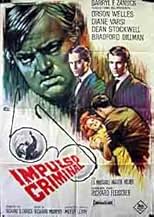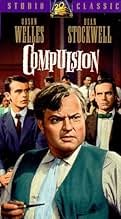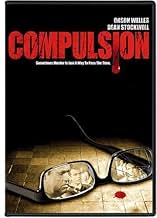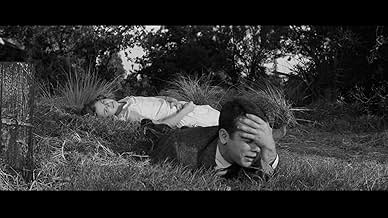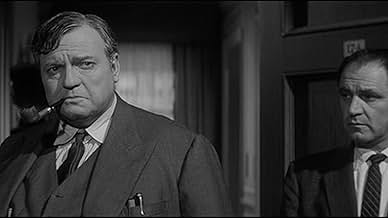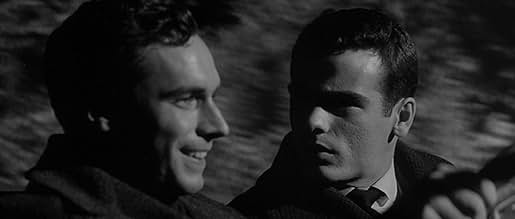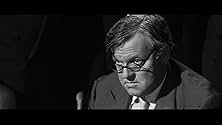AVALIAÇÃO DA IMDb
7,4/10
8,2 mil
SUA AVALIAÇÃO
Dois estudantes ricos da faculdade de direito vão a julgamento por assassinato nesta versão do caso Leopold-Loeb.Dois estudantes ricos da faculdade de direito vão a julgamento por assassinato nesta versão do caso Leopold-Loeb.Dois estudantes ricos da faculdade de direito vão a julgamento por assassinato nesta versão do caso Leopold-Loeb.
- Direção
- Roteiristas
- Artistas
- Indicado para 1 prêmio BAFTA
- 1 vitória e 5 indicações no total
Robert F. Simon
- Police Lt. Johnson
- (as Robert Simon)
John Alban
- Reporter
- (não creditado)
Don Anderson
- Reporter
- (não creditado)
Brandon Beach
- Courtroom Spectator
- (não creditado)
Terry Becker
- Benson - The Angry Reporter
- (não creditado)
Russ Bender
- Edgar Llewellyn - Attorney
- (não creditado)
- Direção
- Roteiristas
- Elenco e equipe completos
- Produção, bilheteria e muito mais no IMDbPro
Avaliações em destaque
We can add Welles to Wilde, Monroe and others who we never respected until they were gone. His pleading for the lives of those crazy boys (as Clarence Darrow did) is an eloquent plea for the ending of the death penalty. Funny, how a barometer like the death penalty tells us so much about a society's relative civility. The US had backed away from it, but is now swinging back toward even public executions (which I would much prefer, as they show all of us how barbaric we have become).
Note that the movie dwells on their 'craziness' and 'richness', not the Jewishness or the homosexual relationships that evoked the wrath of the public in the real case. Both Dillman and Dean Stockwell do an excellent job of drawing out your anger until you find yourself one of the mob yelling for blood. To stem the tide, in comes Orson Welles. Welles' phrasing and meaningful looks struck me again with what a magnificent actor he was, as well as director.
Now I have to go read 'Compulsion', the novel around which this movie was made, to determine what was left out and if it would have contributed to some of the obviously omitted details that make this movie a little choppy. This movie performs the task that great art must take on itself: to provide us insights into life and how it should be lived. That can be done either negatively or positively, by point or counter-point.
Of course, unless you had some excellent writers and actors of the stature of Welles, you wouldn't come up to the quality of this movie. Definitely, black and white contributed to the brooding quality of the film. Color would have detracted, and you'll seldom 'hear' me say this.
Note that the movie dwells on their 'craziness' and 'richness', not the Jewishness or the homosexual relationships that evoked the wrath of the public in the real case. Both Dillman and Dean Stockwell do an excellent job of drawing out your anger until you find yourself one of the mob yelling for blood. To stem the tide, in comes Orson Welles. Welles' phrasing and meaningful looks struck me again with what a magnificent actor he was, as well as director.
Now I have to go read 'Compulsion', the novel around which this movie was made, to determine what was left out and if it would have contributed to some of the obviously omitted details that make this movie a little choppy. This movie performs the task that great art must take on itself: to provide us insights into life and how it should be lived. That can be done either negatively or positively, by point or counter-point.
Of course, unless you had some excellent writers and actors of the stature of Welles, you wouldn't come up to the quality of this movie. Definitely, black and white contributed to the brooding quality of the film. Color would have detracted, and you'll seldom 'hear' me say this.
The film deal with two young men (Bradford Dillman , Dean Stockwell) who murder a pal . They are law students and followers to Nietsche theories . They are investigated by an astute prosecutor (E.G.Marshall) . He's growing suspicion but there isn't one perfect crime . As the relentless justice to be executed and they go on trial for killing . A famous lawyer (Orson Welles) will defend them on the accusation of murderers and under death penalty . A young girl (Diane Varsi) will testify for them .
This highly interesting film is inspired on real events about Nathan Leopold-Richard Lob killing case in Chicago of the 1920s . Although the story was obviously a thinly-disguised recreation of the known murder case , the legal department of 20th Century Fox was still concerned about a possible lawsuit from the still-living Leopold . In fact , a great effort was made not to mention Leopold or Loeb in the film , press releases , and interviews . The film contains suspense , drama , tension , illicit love with intertwining triangles , emotion , courtroom trial and complex intrigue maintained throughout . Besides , superb performances by main roles (Dillman , Stockell , Varsi, Welles) and supporting casting (Martin Milner , Robert F. Simon , Gavin McLeod , among others). Special mention for Orson Welles who displays a terrific acting and explaining a significant speech into criminal court . The movie is visually magnificent with an excellent black and white cinematography by William C. Mellor . Evocative and adjusted music by Lionel Newman . The motion picture was wonderfully directed by Richard Fleischer .
This is the second of four film adaptations of the Leopold-Loeb murder case , other versions about same events are the famous ¨The rope¨ (1948) by Hithcock with John Dall (in the character of Bradford Dillman )and Farley Granger (in the role of Dean Stockwell), ¨Swoon¨ and recently ¨Murder by numbers¨ by Barbet Schroeder with Michael Pitt and Ryan Gosling . Indispensable and fundamental seeing for court genre enthusiasts and Orson Welles fans . It's one of Richard Fleisher's best. Rating : Above average .
This highly interesting film is inspired on real events about Nathan Leopold-Richard Lob killing case in Chicago of the 1920s . Although the story was obviously a thinly-disguised recreation of the known murder case , the legal department of 20th Century Fox was still concerned about a possible lawsuit from the still-living Leopold . In fact , a great effort was made not to mention Leopold or Loeb in the film , press releases , and interviews . The film contains suspense , drama , tension , illicit love with intertwining triangles , emotion , courtroom trial and complex intrigue maintained throughout . Besides , superb performances by main roles (Dillman , Stockell , Varsi, Welles) and supporting casting (Martin Milner , Robert F. Simon , Gavin McLeod , among others). Special mention for Orson Welles who displays a terrific acting and explaining a significant speech into criminal court . The movie is visually magnificent with an excellent black and white cinematography by William C. Mellor . Evocative and adjusted music by Lionel Newman . The motion picture was wonderfully directed by Richard Fleischer .
This is the second of four film adaptations of the Leopold-Loeb murder case , other versions about same events are the famous ¨The rope¨ (1948) by Hithcock with John Dall (in the character of Bradford Dillman )and Farley Granger (in the role of Dean Stockwell), ¨Swoon¨ and recently ¨Murder by numbers¨ by Barbet Schroeder with Michael Pitt and Ryan Gosling . Indispensable and fundamental seeing for court genre enthusiasts and Orson Welles fans . It's one of Richard Fleisher's best. Rating : Above average .
Watching this 1959 Richard Fleischer confirmed something I've always known. Dean Stockwell is a superb actor and an extraordinary presence on the screen. So, I think it's strange that he's not regarded as one of the greatest actors that ever lived. He started as a kid. He was Gregory Peck's son, twice. He was in musicals with Gene Kelly and Frank Sinatra. He was directed by Elia Kazan. He made allegorical movies like "The Boy With Green Hair" directed by black listed Joseph Losey. He was Edmond in "Long Day's Journey Into Night" sharing the screen with Katharine Hepburn, Ralph Richardson and Jason Robards. No to mention his work in "Sons and Lovers" or the movies with Wim Wenders and David Lynch. Here, in "Compulsion" his performance is worthy of an Oscar and in fact he go the accolades at the Cannes Film Festival sharing the acting honors with Orson Welles and Bradford Dillman. But, looking at it now he is the one that comes out as the one who passed in triumph the test of time. His performance is so rich so perfectly modulated that you go straight into the human center of his sick, appalling character. "Compulsion" deserves to be rediscovered and Dean Stockwell's performance should be the main reason.
Seeing "Compulsion" again after a very long time, it amazed me how well I remembered it. In fact I remembered every tiny little turn in Dean Stockwell's eyes. He is superb in the part of the young semi genius with a weakness for the shallow Bradford Dillman. The Leopold and Loeb case was the base for this thrilling Richard Fleischer film. It won acting awards for Stockwell, Dillman and Orson Welles at the Cannes Film Festival but with the benefit of hindsight, Dean Stockwell emerges as the winner against the famous test of time. Dillman seems a little bit too everything. Welles is great fun to watch and E G Marshall is terrific as the man determined to unmask the "powder poofs". Stockwell fainting at the trial, something that could have been so over the top, is in fact, shattering. The Leopold and Loeb story was also the base for Hitchcock's "Rope" and the wonderful Tom Kalin's "Swoon" Another version was rumored in 1991, directed by Martin Donovan with River Phoenix in the Stockwell part.
If "Compulsion" is still such a powerful film is, totally, Dean Stockwell's merit. What a sensational actor! I'm writing this the day after the announcement of Dennis Hopper's death and while I was looking for a Dennis Hopper movie to watch a came across "Compulsion" Not Hopper but Stockwell and I settled for that anyway. I was riveted by Stockwell's performance because everyone else (with the natural exception of Orson Wells and E G Marshall) seems so dated and acted that Dean's every moment is sheer magic. He doesn't shy away from the awfulness but makes his young monster totally human, provoking in us that element that Orson Welles's closing argument tries to bring to the forefront. If you love great acting, you can't afford to miss Dean Stockwell in "Compulsion"
Você sabia?
- CuriosidadesAlthough the story was a thinly-disguised recreation of the Nathan Leopold and Richard Loeb murder case, the legal department of 20th Century Fox was still concerned about a possible lawsuit from the still-living Leopold. A great effort was made not to mention Leopold or Loeb in the movie, press releases, and interviews. However, there was apparently poor communication with the advertising department, since when the movie came out, newspaper ads stated, "based on the famous Leopold and Loeb murder case." Leopold sued the filmmakers. He did not claim libel, slander, nor anything false nor defamatory about the film. Instead, he claimed an invasion of privacy. The court rejected his claim, in part, because Leopold had already published his own autobiography "Life Plus 99 Years," presenting essentially the same facts.
- Erros de gravaçãoWhen the murdered boy is in the morgue, his uncle recognizes him instantly, and the coroner doesn't mention to the young journalist (who found the glasses) that the kid had acid burned all over his face so he couldn't be identified. In the real life case, his face was burned and, most importantly, at the very end of the movie, Orson Welles as the defending attorney mentions that the murdered boy's face was burned with acid.
- Citações
Jonathan Wilk: If there is any way of destroying hatred and all that goes with it, it's not through evil and hatred and cruelty, but through charity, love, understanding.
- Cenas durante ou pós-créditosOpening credits prologue: CHICAGO, 1924
- ConexõesFeatured in The Paper Chase: Commitments (1983)
Principais escolhas
Faça login para avaliar e ver a lista de recomendações personalizadas
Detalhes
- Data de lançamento
- País de origem
- Idioma
- Também conhecido como
- Estranha Compulsão
- Locações de filme
- Empresa de produção
- Consulte mais créditos da empresa na IMDbPro
- Tempo de duração1 hora 43 minutos
- Cor
- Proporção
- 2.35 : 1
Contribua para esta página
Sugerir uma alteração ou adicionar conteúdo ausente


